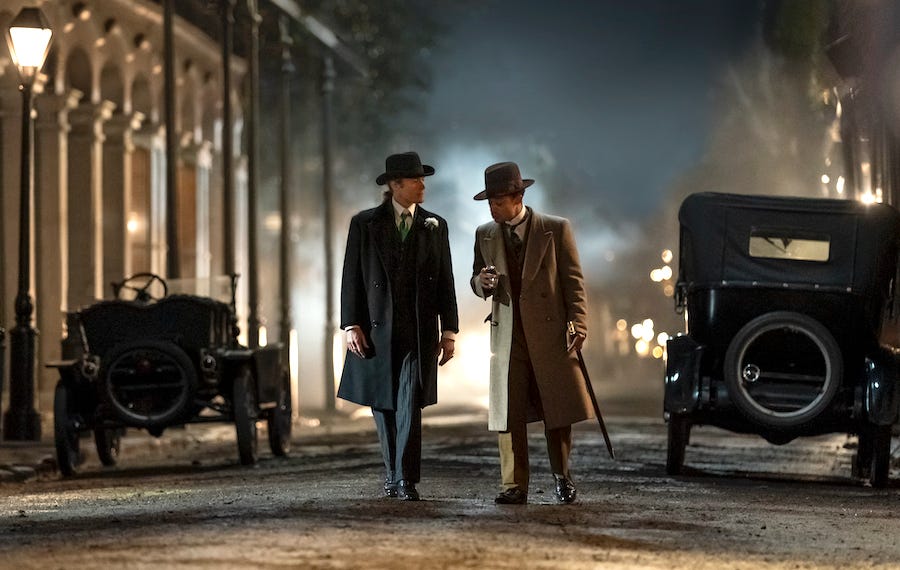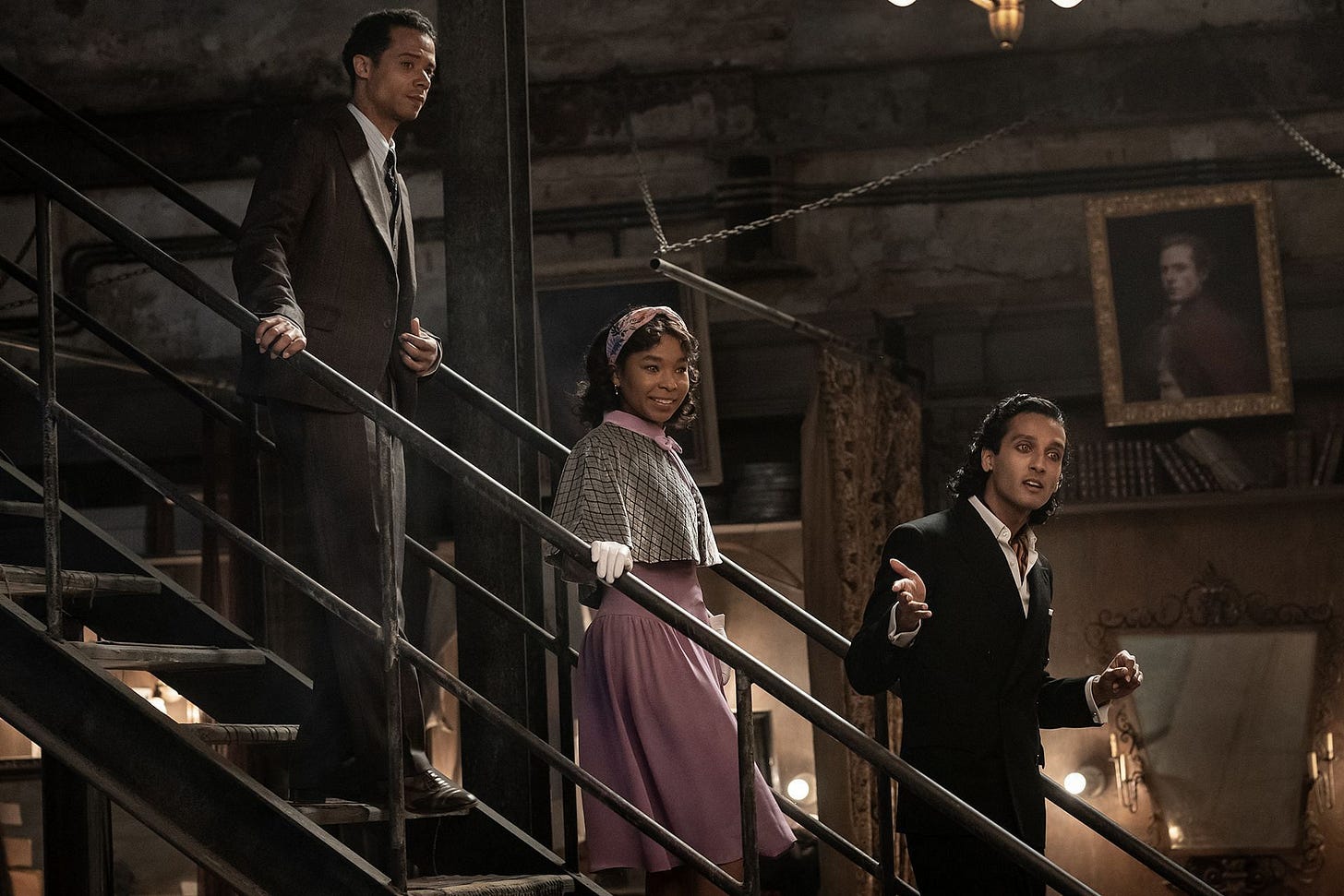the de-fangification of lestat de lioncourt
or how one of gothic literature's most famed villains tried to become our next rousing protagonist in the last fifteen minutes of the season two finale of interview with the vampire.
Sam Reid & Jacob Anderson as Lestat de Lioncourt and Louis de Pointe du Lac, respectively.
While he may never wear a pair of water-skis, it’s no small secret that the character of Lestat de Lioncourt quickly jumps the shark as a Gothic villain in Anne Rice’s The Vampire Chronicles. Although initially described as an other-worldly evil by Louis in Interview With the Vampire, once the trilogy reaches its second act in Lestat’s own words, he is not the monster but simply another man. One in which things happen to him, never because of his own actions. Now in the novel, Lestat (in his own words!) admits that he is selfish and unruly and that that is simply in his nature.
It is not a crime to enjoy characters without morals. Everyone enjoys a well written villain. However, there seems to be an all too popular trend to reach a point in a villain’s story where it becomes more appeasing to certain (white) fans and to (white) monetary gain to discredit every villainous act a character has committed either with one sweeping gesture of life-saving heroism or a third act reveal in which they were never the true villain of the story.
Interview With the Vampire somehow attempted both of these.
Adaptation of such a story is tricky. The entire point of the original two novels is to show that there are multiple sides to every story, and that what is recalled in an interview may not be entirely truthful. But the emphasis in the books is the power of the written word, whereas the show leans heavily on the idea of memory. Memory is a monster is the television show’s tagline, after all. So ever-changing versions of the same story are to be expected. However, there is a difference between fickle recollection and complete disregard for someone’s own lived experience.
In the original novels, Louis de Pointe du Lac is written as a white plantation owner. For the adaptation of the show, they made the brilliant decision to cast Jacob Anderson and redo the timing of the story. While still set in New Orleans, the dynamic between Louis and Lestat is re-envisioned with Louis as a Black man in charge of his family’s trust, which was “capital accrued from plantations of sugar and the blood of men who looked like my great-grandfather but did not have his standing.” But due to Jim Crow and antebellum-era racism that never truly left New Orleans in 1910, Louis had businesses in Storyville, the old red light district.
Lestat, as Louis remembers it, was first drawn to him because of his annoyance and near-attack on his own brother, Paul. Louis concealed much as a human, there wasn’t much in his identity he was allowed to be open about, if anything. He was a closeted Black man in New Orleans at the turn of the century.
The audience understood Armand tampered with Louis’ memories. But there was never the belief that he truly tampered with everything Louis lived through in New Orleans with Lestat and Claudia. And while Daniel poked and prodded at misremembered or half-truths from Louis, it never seemed as if none of it were true. After all, Claudia’s diaries, while rife with anger at both Louis and Lestat, corroborated the mistreatment at the hands of Lestat de Lioncourt.
Instead, what is called to question is how Louis felt about being turned into a vampire. Louis, repeatedly, by his own account is repulsed by the idea of killing for blood. But that is part and parcel to being a vampire, which he is reminded by both Lestat and their vampiric daughter, Claudia. Some of Louis’ tragedy is that in becoming a vampire, he did start to understand the beauty in humanity. Of what he had lost and what he could not return to, an alienation greater than what he had felt even as the oldest son with too much responsibility.
Much like the first two seasons of the show, I have focused more on who Louis is and why that matters before diving into what I personally felt was a massive misstep on the part of the IWTV writing team. For as much as they wanted to emphasize Lestat was a toxic, abusive jerk they still had the end goal of the season to making the audience do a complete 180 on their feelings toward the French vampire. And sure, there are multiple sides to every story. But for a show that many fans of color felt finally portrayed a complicated narrative on abusive and toxic relationships that included both a white man and Black man and a nonwhite man and Black man, the final few moments of the season finale felt like a betrayal.
No one who watched Interview With the Vampire season one & season two expected this to be the Louis de Pointe de Lac show forever (even if I would watch that!). After season one, I personally read the first three Vampire Chronicles novels. People would stop me if they saw me in public reading one of the books, giving their own opinions on Louis and Lestat. It’s no secret this is one of the most hotly contested relationships in modern literature. They both are compelling characters in their own rights, but the real shame about Louis is that after the first book, he has a more peripheral role. He is in attendance as these world-shattering vampiric events happen, but Lestat is the character who actually lives them and yes, first-person narrates them.
Now, to television show Lestat. In the pilot episode of the series, he is a white shadow, lurking in every establishment and street corner. He is haughty and rude but in a supposedly charming way. Compared to the same petty squabbles of the family and the never-ending pressure to keep the businesses in Storyville afloat, Lestat is something otherworldly and exciting to Louis. Even in every way the man unnerves him, there’s a terrible curiosity, too.
Lestat is a self-proclaimed monster, he understands who and what he is and how the world sees him. Part of his control of others, especially Louis and eventually Claudia, is how he lies by omission. Neither can leave him if he withholds information, especially the Ancient Laws of the vampires. And even when he does share what vampires can and cannot do, he is purposefully vague. Now, one might argue that he does this because of his own suffering at the hands of other vampires. Sure, that’s an explanation for why he traipsed across the Atlantic and refused to tell his fledglings any pertinent information about other vampires. But it’s not an excuse.
Louis (Jacob Anderson) and Claudia (Delainey Hayles) are introduced to the theatrical vampire coven by Armand (Assad Zaman).
And as we saw in season two, withholding those very details led Louis and Claudia to ruin. It was selfish and unfair for him to keep the truth of other vampires from them, no matter how Lestat or his apologists try to rationalize it. And if we had ended season two with the implication, the wonderment of Lestat’s full involvement of the trial against Claudia & Louis, perhaps I would be more intrigued to see where we take the story.
Instead, with the creative decision to reveal that it was not Armand who saved Louis, but instead Lestat, my curiosity was all but snuffed out in the last twenty minutes of the finale.
Armand saving Louis in the books was one of his crimes. After all, he saved a man he loved but wouldn’t save his daughter. And while we know that Claudia has been dead from the beginning, this raises more questions than answers. If Lestat saved Louis, it just shows that for a final time he chose Louis over Claudia. Louis does not question this, but instead the two “mourn” for a moment over the death of Claudia.
Obviously nothing is written in a bubble, and the original novel was written as a way for Anne Rice to process the death of her own daughter.
Claudia as a character represents that grief, and she must die.
But Louis and Lestat live on past that novel and grow to become much more than just stand-ins for a writer working through her grief.
I do not understand how the creative team thought Armand saving Louis could save him in the eyes of Louis or the fans. After all, he directed the play that killed his daughter. He rehearsed and worked and agreed to bringing Lestat from across the Atlantic to play his part in the staged work. Everything he did was calculated in such a way that he expected he would be able to leave the coven and take Louis with him, like he does in the book.
Lestat de Lioncourt at the “trial” of Claudia & Louis. (IWTV, Season 2, “I Could Not Prevent It”)
And in fact, I doubly do not understand how they see Lestat saving Louis from damnation saves Lestat in the eyes of anyone. I could perhaps see it if they wanted to show that Louis, who has always had a corrosive and damaging relationship with Lestat, forgave him and painted it in such a way as to show us this is Louis crawling back into the lion’s den. But instead there is swelling music as the two cling to one another as a hurricane billows overhead.
Now, to be fair to the show this only left a sour taste in my mouth, not quite the proverbial nail in the coffin. However, after the finale’s airing there has been interview after interview in which Rolin Jones, show runner, has talked at length about Lestat’s third act reveals absolving him and that his words should be held as the truth in the narrative. I don’t think I need to explain why saying that the white vampire’s words are the objective truth are thoughtless at best and more than dangerous enough to stroke a flame within a fanbase that has more than their fair share of problems with race.
Changing the race of characters is something that is not unheard of, but it is not necessarily always done well. Many, including myself, were intrigued by the way Interview With the Vampire seemed to handle not only changing the race of Louis & Claudia but of Armand, too. This became a story interwoven with both racism by white vampires (the French coven), a nonwhite vampire giving up Black vampires for his own protection & said Black vampires being put on trial for show using minstrel performances. The trial episode of Interview With the Vampire was possibly the best episode of television this year, and now so much of the hard-hitting moments of Lestat’s culpability, Armand’s weakness in how we all assumed he saved only Louis & the coven’s sick amusement at the treatment of Louis & Claudia seems… flat.
This is nothing against the actors, who’ve all given exceptional performances. And even to the writers with whom I have more than a few questions for, I understand the difficulties that come with bringing a piece of art to life. And I would be remiss to not mention how both the writer’s and actor’s strike affected the production of this television show. But I would be equally remiss to not talk about how the finale of a show I have loved so much felt like a small betrayal. As I have read interviews with Jones, I see how clear it became that by the end f season two they wanted the audience primed for The Vampire Lestat. And while I personally have felt rushed and am not quite in the headspace they assumed we would be ready for, I will take solace in the fact there exists two seasons of a show that does an exemplary job of exploring abuse, memory & how we view ourselves in our own personal narratives.







👏🏾👏🏾👏🏾👏🏾👏🏾
I loved reading this!! You portrayed how both Lestat and Armand played their awful roles in the execution of Claudia and how trying to pull Lestat out of his past of racist and domestic abuse in a show written by white people for white people ultimately falls short and leaves a bad aftertaste.
And not only this, but the rushed deus-ex-machina turn of events at the very end of season two does a major disservice to the otherwise very rich and nuanced writing of the show that is Interview with the Vampire. And as we know, people usually remember the beginnings and the endings, so this ending will forever color all of the writing of season two for the worse.
Lastly, great choice on the title of your article. Lestat fans may feel like season two's finale portrayed him in as beautiful, sympathetic, and proper a way as he supposedly deserves, but I ask myself: is this really true? Like you wrote, everybody loves a well-written villain, but I guess this only extends so far as sensitive topics like interracial relationships aren't involved. As soon as we tap too far into that territory, the white villain needs to retract his fangs. And surely, not portraying Lestat as the hero who saved Louis might've condemned him as the abusive borderline-psychotic lover and father who let and participated in the death-by-trial of his two fledlings, but it would've made him a hell of a well-written villain.